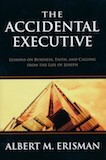The Foundation of God’s Household: What Difference Does It Make?
Daily Reflection / Produced by The High Calling
Consequently, you are no longer foreigners and strangers, but fellow citizens with God’s people and also members of his household, built on the foundation of the apostles and prophets, with Christ Jesus himself as the chief cornerstone. In him the whole building is joined together and rises to become a holy temple in the Lord. And in him you too are being built together to become a dwelling in which God lives by his Spirit.
Ephesians 2:19-22
In Ephesians 2:20, we read that the household of God is "built on the foundation of the apostles and prophets, with Christ Jesus himself as the chief cornerstone." What difference does this theological affirmation make to us today?
First, I want to address a concern that you might have when you read this verse. In 1 Corinthians 3:11, the Apostle Paul writes, "For no one can lay any foundation other than the one already laid, which is Jesus Christ." In context, Paul is talking about the Corinthian church as "God's building" (3:9). Paul, as an apostle, "laid the foundation," namely, Jesus Christ. But Paul did not speak of himself as part of the foundation. Does this mean that 1 Corinthians 3:11 and Ephesians 2:20 are contradictory?
No, this conclusion is not warranted. Paul was using a common metaphor, foundation/building, with appropriate freedom. A good writer does this sort of thing, without feeling bound to use every metaphor in exactly the same way every time. In writing to the Corinthians, Paul wants to underscore the fact that he built the Corinthian church, not on himself or any other human being, but on Christ alone. The Corinthians, you see, were inclined to over-identify with human leaders and under-identify with Christ. Paul sought to remedy this problem.
In Ephesians, Paul was not dealing with a church that was splitting because of excessive and misplaced human loyalty. Rather, he was seeking to highlight the vital role of certain human leaders of the church, while still emphasizing the unique role of Christ, who alone is the "chief cornerstone" (2:20). So, he pictured the foundation of God's household as "the apostles and prophets."
Who are these people? Though we might at first think that the apostles represent New Testament authorities and the prophets represent Old Testament authorities, the Greek language of verse 20 and the context in Ephesians (see, 3:5 and 4:11) make this unlikely. Rather, the "apostles" are those authorized by God to spread the Gospel and plant churches, while the "prophets" are those who communicate God's revelation to the church.
As you may know, there is a debate among Christians today about whether we still have God-ordained apostles and prophets in the church today. I won't engage that debate here, other than to say, no matter how you come down on this question, the earliest Christian apostles and prophets had an extraordinary role in Christian history. Some of their communications were recognized by the church as uniquely inspired by God's Spirit. These writings were collected, used in liturgy and teaching, and ultimately included in the canon of Holy Scripture. When we use the New Testament, therefore, we are grounding our faith and practice to the foundation God laid for his church in the first apostles and prophets. We are basing our beliefs and actions, not on our feelings or cultural whims, but on the sure basis provided by God, of which Christ himself is the mainstay.
QUESTIONS FOR FURTHER REFLECTION: How, practically speaking, is Jesus Christ the foundation of your life? How, practically speaking, is your life grounded on the basis of the apostles and prophets? Why do you think Paul felt it was important to speak of the apostles and prophets as the foundation of God's household?
PRAYER: Gracious God, thank you for the way you have built your household. Thank you for the solid foundation you have given us in the first apostles and prophets. Thank you for gathering their revelation in written form, passed on to us in Scripture. May we be faithful in basing our lives, our faith, our churches, our families, and all that we do in the world on the foundation you have given us. Amen.






